|
Alan Latchley
 CLIVE
ANDERSON: Well now, when it comes to football, one man has for many
years been the most noticeable, the most controversial, and occasionally
the most successful manager this country has ever produced. His
pithy words and abrasive style make as famous off the pitch as he
is on. Ladies and gentlemen, please welcome Alan Latchley. CLIVE
ANDERSON: Well now, when it comes to football, one man has for many
years been the most noticeable, the most controversial, and occasionally
the most successful manager this country has ever produced. His
pithy words and abrasive style make as famous off the pitch as he
is on. Ladies and gentlemen, please welcome Alan Latchley.
 ENTER PETER COOK STAGE RIGHT, AND WALKS TO THE DESK WHER HE JOINS
CLIVE ANDERSON. DRESSED IN A BLUE BLAZER, WHITE SHIRT, BLUE TIE
AND GREY SLACKS.
ENTER PETER COOK STAGE RIGHT, AND WALKS TO THE DESK WHER HE JOINS
CLIVE ANDERSON. DRESSED IN A BLUE BLAZER, WHITE SHIRT, BLUE TIE
AND GREY SLACKS.
WILD APPLAUSE FROM AUDIENCE.
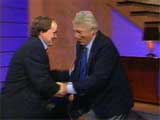 CA:
Ok Alan, jolly good, now it's great to get you. It's obviously very
topical to get you, as you are being, you know, pipped or tipped
for the for the England job. CA:
Ok Alan, jolly good, now it's great to get you. It's obviously very
topical to get you, as you are being, you know, pipped or tipped
for the for the England job.
ALAN LATCHLEY: Oh, it's too early to talk about the England job
now.
CA: OK, well if I'll come back to that in about five minutes, if
I may. Because I want, just to talk about your early career. You
were one of the youngest managers, when you were originally appointed
in the football league, weren't you?
 AL:
Yes, I was appointed manager when I was sixteen and a half. AL:
Yes, I was appointed manager when I was sixteen and a half.
CA: Yes.
AL: At little outskirts of Scunthorpe, close to where I was born.
CA: You're from, very much from Scunthorpe.
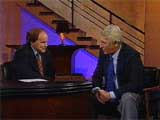 AL:
I'm from Scunthorpe, yes. I'm a Scunny man through and through. AL:
I'm from Scunthorpe, yes. I'm a Scunny man through and through.
CA: Football is very much your life.
AL: It's in me blood, Clive. It's in me blood. I mean without football
I'd be nothing.
CA: Yes.
AL: And, err, I love football. Football is, is, she's a cruel mistress.
She's, she's more than a mistress. She's a wife, she's a mother,
she's a daughter, she's and errant child. She's a… she's a…
she can make you laugh, she make you cry. She can bring tears me
eyes. She can bring blood to me shoulders. She can bring -
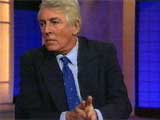 CA:
Yes, bring the kettle to the boil. CA:
Yes, bring the kettle to the boil.
AL: She can bring the kettle to the boil. 'Cause football is about
nothing, unless it's about something and what it is about -
CA: Yes, yes.
AL: Is football. Excuse me.
CA: Now, at Scunthorpe -
AL: Scunthorpe, yes.
 CA:
You were manager there - CA:
You were manager there -
AL: I was manager till sixteen and a half.
CA: Yeah, briefly and what did you think you bring to, you brought
to Scunthorpe?
AL: I brought heart, and I brought defiance. I brought all those
qualities that make this country what it is today -
CA: Yes.
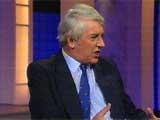 AL:
A certain, a certain feeling, a certain love, a certain heart, a
certain toughness. Mental toughness and physical toughness and,
and, and some, something so beautiful, I can scarcely express it.
You see when I was manager, briefly, when I was young, I didn't
know much. I knew nothing. I'd come straight up from the moors,
and I was put in charge of a thriving club. So what did I do? I
was just a lad! What did I do? I'll tell you what I did Clive. I
read a book. AL:
A certain, a certain feeling, a certain love, a certain heart, a
certain toughness. Mental toughness and physical toughness and,
and, and some, something so beautiful, I can scarcely express it.
You see when I was manager, briefly, when I was young, I didn't
know much. I knew nothing. I'd come straight up from the moors,
and I was put in charge of a thriving club. So what did I do? I
was just a lad! What did I do? I'll tell you what I did Clive. I
read a book.
CA: Yes.
AL: "How to manage".
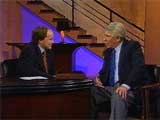 CA:
Yes, and whose book was that? CA:
Yes, and whose book was that?
AL: That was me dad's book, "How I managed". It was not
about football, but about life in general.
CA: Yes, but what do you say you have to do to get a team going?
What is it? What is the quality?
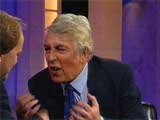 AL:
[PAUSE] Belief. Motivation. Motivation, motivation, motivation!
The three M's. That's what football is about. It's all about motivation. AL:
[PAUSE] Belief. Motivation. Motivation, motivation, motivation!
The three M's. That's what football is about. It's all about motivation.
CA: Motivation, I follow that.
AL: You've got to get those boys on the pitch, motivated. It's
no good saying go out and buy some ice cream, go to the pictures.
You've got to tell them what they're doing. You've got to motivate
them onto the pitch. Push them out with forks if you need to, but
get them out onto the pitch. And then when the game's over, get
them in again.
CA: Now, you went to Hartlepool, and you had this system of getting
them angry. Was that -
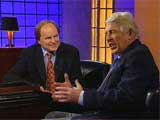 AL:
Well, you know rage is very much an adrenaline inducing factor in
all sports. AL:
Well, you know rage is very much an adrenaline inducing factor in
all sports.
CA: Yes.
AL: I mean Linford Christie wasn't in a good mood when he won the
hundred metres, was he?
CA: Well, he was afterwards.
AL: Yes, but you've got to be in a rage to bring out the best in
yourself. And what I do to my players, one of the tactics, this
was an early tactic, is to kidnap their wives. Or girlfriends! Girlfriends
or wives. I'd send them all on a bus up to Grimsby, with no ticket
back, and, errm, the lads went mad. They were -
 CA:
Yes. CA:
Yes.
AL: There was one game against Rotherham, my whole team was sent
off, almost as soon as they got on.
CA: Yes. Right. The other sort of weird thing you used to use.
I'll not say 'weird', but -
AL: Odd.
CA: Odd.
 AL:
Quirky! Quirky. AL:
Quirky! Quirky.
CA: Quirky.
AL: Quirky.
CA: Your father was something to do with the circus. Now how did
that come into -
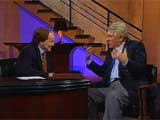 AL:
Yes, The Great Escapini my father was, he used to a vanishing act.
He would lock himself up in a suitcase, usually in a hotel room,
as soon as the bill arrived. And, err, and he would escape from
the suitcase. And with that background I formed the Escapini Defence. AL:
Yes, The Great Escapini my father was, he used to a vanishing act.
He would lock himself up in a suitcase, usually in a hotel room,
as soon as the bill arrived. And, err, and he would escape from
the suitcase. And with that background I formed the Escapini Defence.
CA: Right.
AL: Which consisted of a ten-man defensive unit -
CA: Yes.
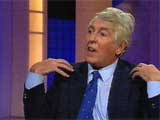 AL:
I had them stood on each other's shoulders in the goal mouth, their
back, back to the opposing team - AL:
I had them stood on each other's shoulders in the goal mouth, their
back, back to the opposing team -
CA: I see.
AL: And they'd just sit there and we'd rely on rebounds.
CA: Oh right. And you only lasted, what a couple of weeks at Hartlepool?
AL: Two weeks at Hartlepool. Well, I'm a Scunny man, and they don't
like Scunny people at Hartlepool.
CA: No, no. And, err, along with many other managers, you went
along to Manchester City.
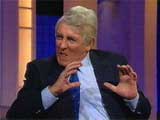 AL:
Man City, yes. That's where I introduced the concept of equal playing
facilities. Namely, that if you had skilful players on your team,
that was no excuse for them playing better than the others. 'Cause
it makes the other ones feel, you know - AL:
Man City, yes. That's where I introduced the concept of equal playing
facilities. Namely, that if you had skilful players on your team,
that was no excuse for them playing better than the others. 'Cause
it makes the other ones feel, you know -
CA: Inferior.
AL: Inferior. Which lets face it, I wouldn't say this if I had
a team with me now, but some of them are worse than the others.
And my tactic was to get them all down to exactly the same level.
CA: And what about going for the England manager's job? Now what,
you're a friend of Graham Taylor's [note from Anne T'ing - Graham
Taylor was the one time manager of the England football team] I
know.
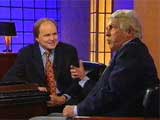 AL:
I'm a friend of Graham, and I won't speak ill of the man. AL:
I'm a friend of Graham, and I won't speak ill of the man.
CA: No.
AL: He did a cracking job. When you look at the potential he had
there, and his ability to turn it into those results, you have to
realise that you are dealing with somebody unusual.
CA: Yes, yes. You say you won't speak ill of him, but you have
spoken ill of him on TV programmes, and every other football manager.
What, so what is it that you think you could bring to the England
job, that your rivals couldn't?
AL: I would bring heart, and motivation.
CA: Motivation.
 AL:
And let us work our way up from the bottom, and stay there if we
can. AL:
And let us work our way up from the bottom, and stay there if we
can.
CA: Now, I know apart from your football activities, and I know
you keep well in touch with football, but you do have, what is it?
Management seminars that you run? To apply your methods to other
industries.
AL: Ah, yes I have a course called "Dare To Fail".
CA: Yes.
AL: In which people who are ambitious, people who've had some degree
of success in life, can come along and see what it's like to be
at the bottom of the pile, and learn how to get there with pride
and dignity in tact.
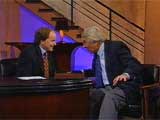 CA:
Yes. CA:
Yes.
AL: And it's with a slide presentation, and it's a very nice week
you spend in the country, locked up, you're not allowed to smoke,
drink or sleep.
CA: Right.
AL: And it's a way of just teaching people.
CA: So, "Dare To Fail" is the slogan?
 AL:
Well, the other side of failure, Clive, is success. AL:
Well, the other side of failure, Clive, is success.
CA: Yes, I follow that. Would you say that your career has largely
been a failure?
AL: Or a success. Depends on how you look at the coin. Just toss
it in the air, and let it fall, you know not where.
CA: Yes.
 AL:
But I can look at myself in the mirror in the morning, and say,
"There is a man". AL:
But I can look at myself in the mirror in the morning, and say,
"There is a man".
CA: Thank you, very much, Alan Latchley.
[PETER COOK STARES AT CLIVE ANDERSON IN A MOST INTENT MANNER]
RETURN TO TOP
Go to > > > Sir
James Beauchamp
|


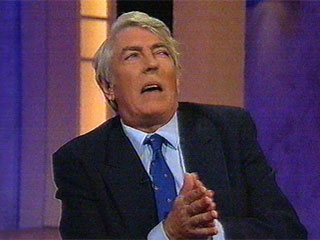

 ENTER PETER COOK STAGE RIGHT, AND WALKS TO THE DESK WHER HE JOINS
CLIVE ANDERSON. DRESSED IN A BLUE BLAZER, WHITE SHIRT, BLUE TIE
AND GREY SLACKS.
ENTER PETER COOK STAGE RIGHT, AND WALKS TO THE DESK WHER HE JOINS
CLIVE ANDERSON. DRESSED IN A BLUE BLAZER, WHITE SHIRT, BLUE TIE
AND GREY SLACKS. CA:
Ok Alan, jolly good, now it's great to get you. It's obviously very
topical to get you, as you are being, you know, pipped or tipped
for the for the England job.
CA:
Ok Alan, jolly good, now it's great to get you. It's obviously very
topical to get you, as you are being, you know, pipped or tipped
for the for the England job. AL:
Yes, I was appointed manager when I was sixteen and a half.
AL:
Yes, I was appointed manager when I was sixteen and a half. AL:
I'm from Scunthorpe, yes. I'm a Scunny man through and through.
AL:
I'm from Scunthorpe, yes. I'm a Scunny man through and through. CA:
Yes, bring the kettle to the boil.
CA:
Yes, bring the kettle to the boil. CA:
You were manager there -
CA:
You were manager there - AL:
A certain, a certain feeling, a certain love, a certain heart, a
certain toughness. Mental toughness and physical toughness and,
and, and some, something so beautiful, I can scarcely express it.
You see when I was manager, briefly, when I was young, I didn't
know much. I knew nothing. I'd come straight up from the moors,
and I was put in charge of a thriving club. So what did I do? I
was just a lad! What did I do? I'll tell you what I did Clive. I
read a book.
AL:
A certain, a certain feeling, a certain love, a certain heart, a
certain toughness. Mental toughness and physical toughness and,
and, and some, something so beautiful, I can scarcely express it.
You see when I was manager, briefly, when I was young, I didn't
know much. I knew nothing. I'd come straight up from the moors,
and I was put in charge of a thriving club. So what did I do? I
was just a lad! What did I do? I'll tell you what I did Clive. I
read a book. CA:
Yes, and whose book was that?
CA:
Yes, and whose book was that? AL:
[PAUSE] Belief. Motivation. Motivation, motivation, motivation!
The three M's. That's what football is about. It's all about motivation.
AL:
[PAUSE] Belief. Motivation. Motivation, motivation, motivation!
The three M's. That's what football is about. It's all about motivation. AL:
Well, you know rage is very much an adrenaline inducing factor in
all sports.
AL:
Well, you know rage is very much an adrenaline inducing factor in
all sports. CA:
Yes.
CA:
Yes. AL:
Quirky! Quirky.
AL:
Quirky! Quirky. AL:
Yes, The Great Escapini my father was, he used to a vanishing act.
He would lock himself up in a suitcase, usually in a hotel room,
as soon as the bill arrived. And, err, and he would escape from
the suitcase. And with that background I formed the Escapini Defence.
AL:
Yes, The Great Escapini my father was, he used to a vanishing act.
He would lock himself up in a suitcase, usually in a hotel room,
as soon as the bill arrived. And, err, and he would escape from
the suitcase. And with that background I formed the Escapini Defence. AL:
I had them stood on each other's shoulders in the goal mouth, their
back, back to the opposing team -
AL:
I had them stood on each other's shoulders in the goal mouth, their
back, back to the opposing team -  AL:
Man City, yes. That's where I introduced the concept of equal playing
facilities. Namely, that if you had skilful players on your team,
that was no excuse for them playing better than the others. 'Cause
it makes the other ones feel, you know -
AL:
Man City, yes. That's where I introduced the concept of equal playing
facilities. Namely, that if you had skilful players on your team,
that was no excuse for them playing better than the others. 'Cause
it makes the other ones feel, you know - AL:
I'm a friend of Graham, and I won't speak ill of the man.
AL:
I'm a friend of Graham, and I won't speak ill of the man. AL:
And let us work our way up from the bottom, and stay there if we
can.
AL:
And let us work our way up from the bottom, and stay there if we
can. CA:
Yes.
CA:
Yes. AL:
Well, the other side of failure, Clive, is success.
AL:
Well, the other side of failure, Clive, is success. AL:
But I can look at myself in the mirror in the morning, and say,
"There is a man".
AL:
But I can look at myself in the mirror in the morning, and say,
"There is a man".